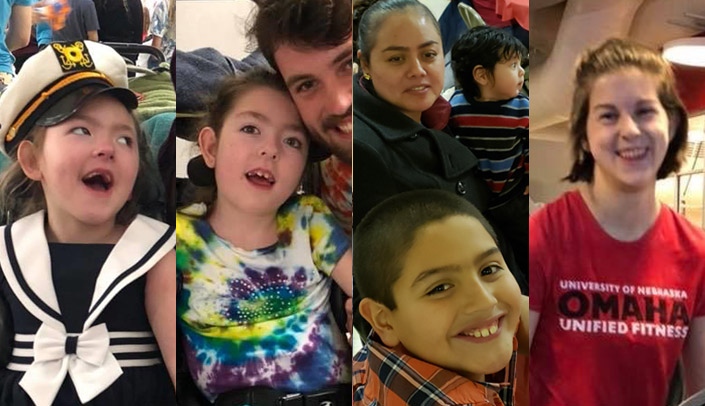The COVID-19 pandemic has turned 2020 upside down, disrupting lives, schedules and routines.
But for families who have a loved one with an intellectual and/or developmental disability, the chaos and fear is particularly acute. The fatality rate for individuals ages 18 to 74 who contact the virus is 2.7%, compared to 4.5% for individuals with intellectual and developmental disabilities. As a result, many families have been taking stringent precautions — while also trying to grapple with the need for services.
Here are three families facing challenges in the COVID-19 era and how the Munroe-Meyer Institute is trying to help them.
Rachel’s story
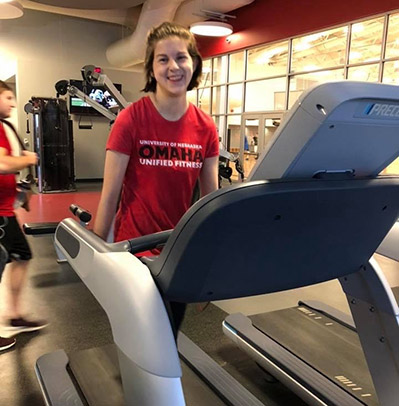 |
Rachel |
Rachel was at “the game.”
On Feb. 29, a Special Olympics basketball game in Fremont, Nebraska, gained statewide attention when it was revealed that players, coaches and other attendees might have been exposed to COVID-19.
Rachel, a young woman with developmental delays and a longtime Special Olympics participant, went into quarantine, along with her father, after news broke of the possible exposure.
“She had to quarantine just to be on the safe side,” said her mother, Pam.
Even though no one in her family has contracted COVID-19, the pandemic has impacted Rachel’s life. Since the game, Rachel’s been furloughed from her job. Her in-home support person stopped coming because she had to stay home with her own children. MMI’s Trailblazer program, which helps young adults with IDD attend college courses at the University of Nebraska at Omaha, closed as UNO suspended classes. Even her book club stopped meeting.
“Before COVID-19, Rachel was not in the house that often,” Pam said. “She always had something – the MMI Trailblazer program, volunteering, her Special Olympic sports. This has been a big adjustment – everything has been taken away from her.
“My husband and I didn’t realize how important her routine was for her,” Pam said. “There have been a lot of tears.”
Rachel admits it’s been difficult, although she is trying to remain positive. The Trailblazer program eventually resumed online, and Special Olympics teamed with the University of Nebraska at Omaha to create exercise videos that Rachel has used.
But important socialization activities are missing, Pam said. “She’s contacted one friend through Facebook, but it’s not the same.”
Still, Rachel and Pam are upbeat when they talk about virtual cooking club meetings and online occupational therapy and physical therapy with MMI.
“We get the iPad and set it up in the kitchen so the OT (occupational therapist) can watch Rachel work on skills with cooking and how she’s moving her wrist — flipping the grilled cheese was something they worked on,” Pam said.
“The Trailblazer program got moved online, too,” Rachel said.
Pam said she appreciates the efforts of MMI to keep Rachel connected with virtual activities such as the cooking club. Parent resource coordinator Rachel Ray also held meetings with the Trailblazer students and the Special Olympic athletes; Rachel attended both.
“MMI has been a great help during this time,” Pam said. “We’ve always used MMI programming, and we appreciate how they have adapted to try to continue to give Rachel the services she needs.”
Lucia’s story
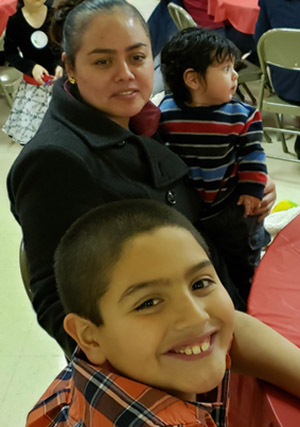 |
Lucia and Jesus |
When Lucia’s family contracted COVID-19, the impact was devastating.
Lucia’s son, Jesus, has received services at MMI in the past, but now the family works with MMI parent resource coordinator Jessica Gutierrez to access community services and supports while Jesus receives therapy through another community agency.
The family of five — diagnosed early in the pandemic — have since recovered, but the effects linger.
“The main thing was my husband losing his job,” Lucia said. “They cut his hours, and the workplace told him that they’d call him back when everything settled, but they’ve never called. He’s been two or three months without a job.”
Lucia’s husband has recently returned to work.
The diagnosis also meant her young son could no longer receive in-person services, and the family faces language barriers that make telehealth difficult.
Still, the lack of in-person intervention had an effect.
“I saw a little bit of regression,” Lucia said. “He got more anxious; he wanted to eat more, was watching TV more. He spent a lot of time playing with the tablet. We’ve resumed services now, but I can still see the effects.”
“We were so scared,” she said. “Mostly because, although he is diagnosed with autism, he also has an asthma diagnosis. I was afraid to even get close to him.”
Lucia’s family continues to struggle with Social Security to access services, Gutierrez said, a problem they were having even before the virus.
Gutierrez meets with the family monthly in her role as an MMI parent resource coordinator, and she recently helped them get a COVID-19 relief grant from the Autism Action Partnership. She continues to connect them with necessary community supports, and the family comes to her office every month to fax information to the Social Security office so they can continue to access benefits.
“Not having the income, my husband not having work, we really didn’t know what we were going to do,” Lucia said. “But Jessica has been a big help.”
Jess’s story
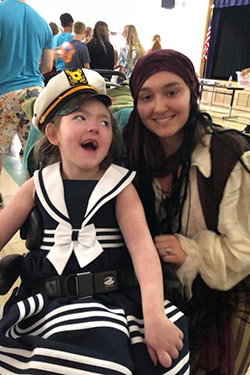 | 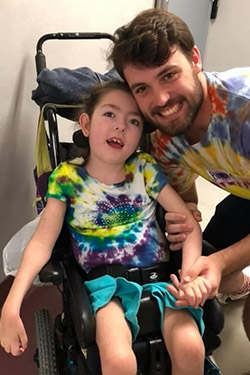 |
Alyzabeth | Madelynn |
Jess’s daughters, Alyzabeth, 8, and Madelynn, 10, left school in the middle of March when classes moved online. For the girls, who both have cerebral palsy, that meant not only being removed from friends, but also from the physical, occupational and speech therapy services that they received as part of their individualized education plan.
When the girls began attending MMI’s Camp Munroe in July, it was the only social activity they’d left the house for since March — and even then, Jess thought long and hard about whether to send them.
Since March, the family has mostly stayed home. If someone did leave the house, they’d shower and change clothes as soon as they returned. “Everything in our house basically stopped, but I’d rather have to go through all that than have one of my girls in the hospital or worse,” Jess said.
“In 2019, Madeline was in the hospital in the ICU for a combination of flu and pneumonia, and I didn’t know if she was going to make it — and that was something we knew how to treat.”
Navigating life amid the threat of COVID-19 has been difficult, she said, especially for the girls, who enjoy seeing their friends and going places outside the home.
“How do you explain to nonverbal children — or I guess any child — what’s happening and why they can’t see their friends? It’s been hard.
“You can’t know if they understand what’s going on. You put masks on them for 30 minutes to go to the dentist. They can’t take them off, because they can’t reach up (because of their CP), but that doesn’t mean they like wearing them.”
The family still is being careful.
“It continues to be very hard and stressful, but I am so grateful that they were accepted to go to camp. I just wish that the greater population would realize how much special needs children and their parents are struggling,” she said.
Jess called the resumption of Camp Munroe a “godsend” for her girls.
“They go to camp every year,” she said. “It’s a lifesaver for the girls to have a place to go and be themselves and see familiar faces. But we did debate sending them this year. We talked with our pediatrician and decided since MMI was taking such stringent safety precautions, we felt comfortable.”
